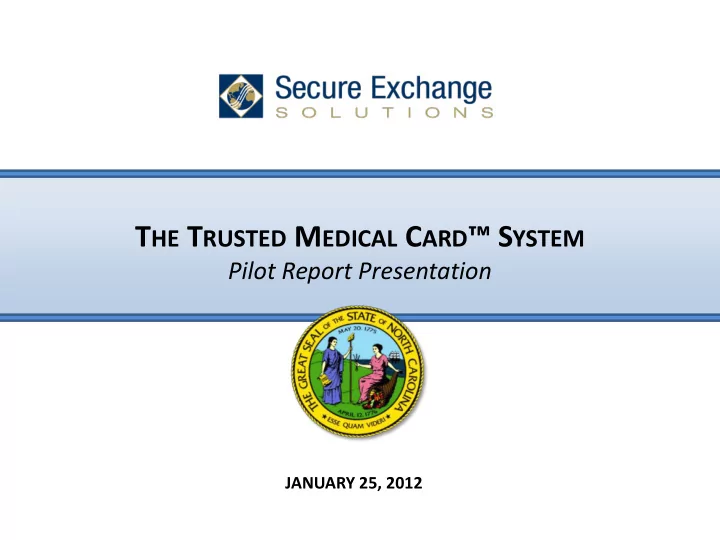

T HE T RUSTED M EDICAL C ARD ™ S YSTEM Pilot Report Presentation JANUARY 25, 2012
What is a Smart Card? A smart card is a device that includes an embedded integrated circuit that can be either a secure microcontroller or equivalent intelligence with internal memory or a memory chip alone. The card connects to a reader with direct physical contact or with a remote contactless radio frequency (RFID) interface. With an embedded microcontroller, smart cards have the unique ability to store large amounts of data, carry out their own on-card functions (e.g., encryption and mutual authentication) and interact intelligently with a smart card reader. Smart card technology is available in a variety of form factors, including: Embedded circuit plastic cards Key-fobs Watches Subscriber identification modules used in GSM mobile phones USB-based tokens 2
Smart cards offer a number of features that can be used to provide or enhance privacy protection information driven systems, which drives cost, these features are: Authentication, Secure data storage, Encryption and digital signature capabilities, Strong device security, Secure communications, Biometrics, Personal device, and Certifications. 3
Smart Card Health Care Implementations Considerations Security Interoperability Across Multiple Systems Initial Implementation Costs • Program Management • Software Development • Installation and Training Continuing Support Costs • Software Maintenance (Driver Upgrades) • Hardware Maintenance • Crypto-Key Management 4
Smart Cards in Diverse Heath Care Environments Trusted Medical Card™ Links Trusted Card ™ together Disparate Health Care USB Card Systems and becomes the PHR Universal Vaults Exchange I N T E R O P E R A B I L I T Y [portable w/ Excellent ubiquity, but capacity] centralized vulnerability for hackers (Microsoft Health Vault) Embedded Chip Card >>>>> Portable, large capacity, and highly secure HIE/HBE Meaningful Use “Area of Fulfillment” Portable Limited to States, but Getting more secure, but centralized vulnerability for lacks storage capacity to hackers move upward >>>>> Mag Stripe Limited Data Independent S/W Transfer Solutions EPIC, Allscripts, etc. Well accepted, but lacks capacity HIPPA Public Vulnerable >>>>>> >>>>>> Compliance Trust S E C U R I T Y 5
TMCS North Carolina Pilot Pilot Objectives The principal aim of the pilot was to evaluate the feasibility of distributing cards to recipients and integrating with current clinical practices to help establish recipient eligibility in real-time and to evaluate the overall impact on the health delivery system. This was done by assessing the following concerns: Would such a program be cost effective and usable for providers, Medicaid recipients and North Carolina’s Medicaid Program? Would the cards be carried by patients, used by providers and reduce administrative burden? Could the system be used to integrate multiple DHHS and other services? What other services could be provided by the Trusted Medical Card™ System? and If implemented, what are the potential savings to North Carolina in a phased implementation? 6
TMCS North Carolina Pilot Pilot Overview Registration Functionality Interface with NC EIS -Once proven eligible, card data populated from database Multiple Location Functionality (4 locations) Binds Patient to Doctor Location – Provides Elapsed Time Size of Eligibility Database -Currently ~252,000 (updated every 24 hours) Enabled Single Sign-In Number of Cards Issued: 540 Number of Cards Re-used: 95 Number of Transactions: 12,500+ Card Failures: 1 (Construction Defect) 7
Results / Findings / Observations Key Pilot Findings & Observations Technical Integration with State’s Eligibility Database: Successful Card Issuance: Simple Medicaid Eligibility: Accurately and Quickly Verified Authentication: Highly Accurate Patients: Exhibited a “Sense of Pride” in Card Ownership Provides a “Front End T ransaction / Policy “ Service Model (e.g.: Credit Card Fraud Monitoring) Provides a Flexible, Adaptable Platform – Seamless Integration Prevents Identity Fraud Prevents Provider Fraud - Phantom Billing Impacts Up-coding Fraud Saves: Money – State, Medicaid Provider, and Federal 8
Results / Findings / Observations Other Observations Confirmed System Functionality and Ease of Use Registration - Identification at the Point of Service (POS) No Additional Equipment Required No Software Support Required – Easily Interfaced to Office Systems Compliant with CMS Funding Initiatives (Grant Initiatives) Minimum Support & Training Required Supports and is Compliant with Current NC and US Legislation Improves Efficiency and Greatly Reduces Administrative Costs Throughout Entire Health Care System (Increases Administrative Efficiencies and Productivity Enhancements) Provides Single Platform for Multi-Services (Identity and Eligibility Throughout the State and Federal Programs) Can Increase Billing Accuracy and Efficiency 9
Value Proposition TMCS Potential Financial Impact Summary Financial Beneficiary of TMCS System* Annual Savings $226,000,000 HEALTHCARE PROVIDERS - Eligibility validation efficiencies Avoidance of services to ineligible patients - 203,000,000 STATE MEDICAID PROGRAM - Patient-based fraud Provider-based fraud - 413,000,000 FEDERAL GOVERNMENT Medicaid Match at 67% - Total Savings $842,000,000 *Assumes statewide implementation of piloted functionality. OR: $2,306,856 / Day 10
The Trusted Medical Card ™ System : Complies with Senate Bill 307 Demonstrates “Ease of Use” and Acceptance Provides a Electronic Identity Across Multiple Services Prevents Identity and Provider Fraud In Addition, it Creates an Overall “Win – Win – Win” Scenario : Win: Patient – Better Health Care at the Point of Service Win: Provider – Efficient Process that Saves Time and Money Win: State – Provides: Single Interface, Stops Fraud, and Improves Efficiency 11
Thank You J ANUARY 2012 Secure Exchange Solutions Inc. 801 Cromwell Park Drive, Suite 100 Glen Burnie, Maryland 21061 12 410.590.6494 www.ses11.com
Recommend
More recommend